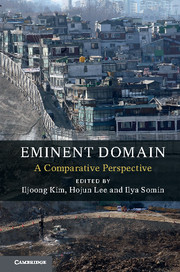Book contents
- Eminent Domain
- Reviews
- Eminent Domain
- Copyright page
- Contents
- Contributors
- Acknowledgements
- Introduction
- 1 Taking Law from an Economic Perspective with Reference to German Law
- 2 Eminent Domain in the United States
- 3 Direct Expropriation: Multi-Layered Legal Protection in Europe
- 4 Eminent Domain Law in Taiwan: New Law, Old Practice?
- 5 Compulsory Land Acquisition in Developing Countries: Shifting Paradigm or Entrenched Legacy?
- 6 Public Interest Criteria and Korea’s Scrutiny System
- 7 Who Exercises the Eminent Domain Power in Korea? A Focus on Private Takings
- 8 Just Compensation in Eminent Domain in Korea: From the Perspective of Fairness
- 9 Overall Due Process in Takings in Korea
- 10 Distribution of Development Surplus in Takings*
- 11 Takings, Disputes, and Resolutions in Korea: A Quantitative Review
- Conclusion
- Index
- References
8 - Just Compensation in Eminent Domain in Korea: From the Perspective of Fairness
Published online by Cambridge University Press: 20 April 2017
- Eminent Domain
- Reviews
- Eminent Domain
- Copyright page
- Contents
- Contributors
- Acknowledgements
- Introduction
- 1 Taking Law from an Economic Perspective with Reference to German Law
- 2 Eminent Domain in the United States
- 3 Direct Expropriation: Multi-Layered Legal Protection in Europe
- 4 Eminent Domain Law in Taiwan: New Law, Old Practice?
- 5 Compulsory Land Acquisition in Developing Countries: Shifting Paradigm or Entrenched Legacy?
- 6 Public Interest Criteria and Korea’s Scrutiny System
- 7 Who Exercises the Eminent Domain Power in Korea? A Focus on Private Takings
- 8 Just Compensation in Eminent Domain in Korea: From the Perspective of Fairness
- 9 Overall Due Process in Takings in Korea
- 10 Distribution of Development Surplus in Takings*
- 11 Takings, Disputes, and Resolutions in Korea: A Quantitative Review
- Conclusion
- Index
- References
- Type
- Chapter
- Information
- Eminent DomainA Comparative Perspective, pp. 208 - 229Publisher: Cambridge University PressPrint publication year: 2017
References
References in English
References in Korean
- 1
- Cited by

